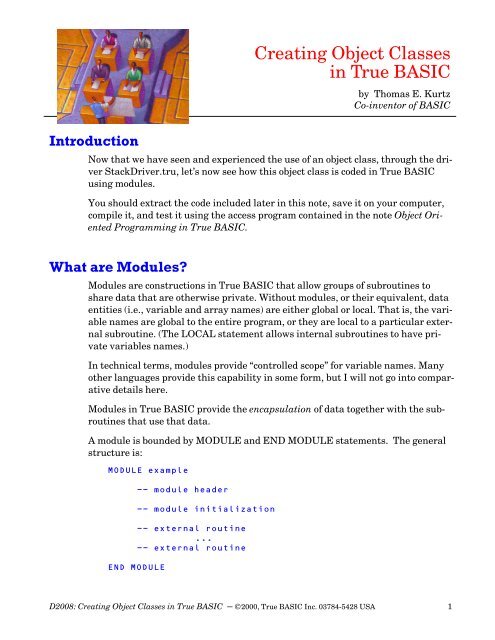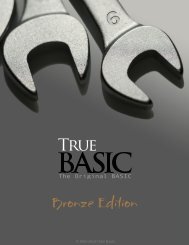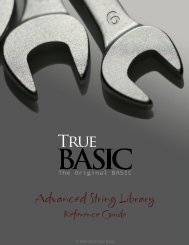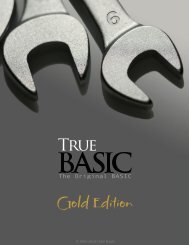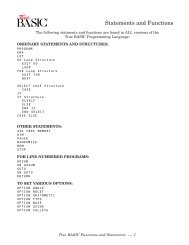Download - True BASIC
Download - True BASIC
Download - True BASIC
You also want an ePaper? Increase the reach of your titles
YUMPU automatically turns print PDFs into web optimized ePapers that Google loves.
Introduction<br />
Creating Object Classes<br />
in <strong>True</strong> <strong>BASIC</strong><br />
by Thomas E. Kurtz<br />
Co-inventor of <strong>BASIC</strong><br />
Now that we have seen and experienced the use of an object class, through the driver<br />
StackDriver.tru, let’s now see how this object class is coded in <strong>True</strong> <strong>BASIC</strong><br />
using modules.<br />
You should extract the code included later in this note, save it on your computer,<br />
compile it, and test it using the access program contained in the note Object Oriented<br />
Programming in <strong>True</strong> <strong>BASIC</strong>.<br />
What are Modules?<br />
Modules are constructions in <strong>True</strong> <strong>BASIC</strong> that allow groups of subroutines to<br />
share data that are otherwise private. Without modules, or their equivalent, data<br />
entities (i.e., variable and array names) are either global or local. That is, the variable<br />
names are global to the entire program, or they are local to a particular external<br />
subroutine. (The LOCAL statement allows internal subroutines to have private<br />
variables names.)<br />
In technical terms, modules provide “controlled scope” for variable names. Many<br />
other languages provide this capability in some form, but I will not go into comparative<br />
details here.<br />
Modules in <strong>True</strong> <strong>BASIC</strong> provide the encapsulation of data together with the subroutines<br />
that use that data.<br />
A module is bounded by MODULE and END MODULE statements. The general<br />
structure is:<br />
MODULE example<br />
-- module header<br />
-- module initialization<br />
-- external routine<br />
...<br />
-- external routine<br />
END MODULE<br />
D2008: Creating Object Classes in <strong>True</strong> <strong>BASIC</strong> – ©2000, <strong>True</strong> <strong>BASIC</strong> Inc. 03784-5428 USA 1
The module header consists first of all the declarative statements that are needed.<br />
These include PRIVATE, PUBLIC, DECLARE PUBLIC, and SHARE statements.<br />
Compiler directives such as OPTION TYPO and OPTION NOLET should go here<br />
as well.<br />
The module initialization includes regular <strong>True</strong> <strong>BASIC</strong> statements. These will be<br />
executed at program startup time, and provide for initialization of any variables,<br />
etc., for which the initial value is important. For example, values should be<br />
assigned to variables used as constants in module initialization. And variables<br />
designed to distinguish between first and subsequent uses of a routine should be<br />
initialized in the module initialization.<br />
After module initialization come any number of external routines. These can be<br />
subroutines, defined functions, or pictures. Any variables used within these external<br />
routines, other than SHAREd or PUBLIC variables, are local to the routine in<br />
which they appear, since the routines are considered to be external.<br />
Variables that are designed to be shared by the external routines within a module<br />
must appear in a SHARE statement in the module header. Such variables are like<br />
global variables in a program, but they are not accessible from outside the module!<br />
This provides the data isolation or data encapsulation so crucial to OOP.<br />
Implementation Details<br />
The push-down stack object in <strong>True</strong> <strong>BASIC</strong> takes advantage of the fact that arrays<br />
and strings occupy dynamic storage (on the heap.) The size of an array can grow<br />
or shrink. The length of a string can grow or shrink arbitrarily, up to the amount<br />
of available memory. Most requirements for dynamic storage can therefore be met<br />
by storing the desired data in arrays or strings. There is no need for an alloc function.<br />
Since <strong>True</strong> <strong>BASIC</strong> does not provide pointers (e.g., to allocated storage) per se,<br />
linked data structures must be implemented with arrays, with one array set aside<br />
for use a the contents of a node, and another set aside for use as the pointer to the<br />
next node.<br />
Push down stacks can, of course, be implemented using linked lists. But it is also<br />
possible to implement them with strings or arrays, since all the activity is from the<br />
front end of the stack. Here, we chose to implement a particular stack as a string.<br />
We keep the list of stack names in a string array.<br />
Here is the code.<br />
MODULE Stack<br />
! This module provides for multiple stacks, and has as its<br />
! purpose illustrating modules.<br />
! The operations on stacks include:<br />
D2008: Creating Object Classes in <strong>True</strong> <strong>BASIC</strong> – ©2000, <strong>True</strong> <strong>BASIC</strong> Inc. 03784-5428 USA 2
!<br />
! DEF Create (stack_name$) Creates a new stack.<br />
! Returns number of the new<br />
! stac, which is >= 1;<br />
! returning -1 means that the<br />
! stack name is already in use.<br />
!<br />
! DEF Push (stack_name$, item) Pushes an item onto a stack.<br />
! Returns the status;<br />
! 0: ok<br />
! -1: stack doesn't exist.<br />
!<br />
! DEF Pop$ (stack_name$) Returns item popped from stack<br />
! Returns the popped element,<br />
! except<br />
! Returns "empty" if stack is empty.<br />
! Returns "not there" if the stack<br />
! is not there.<br />
!<br />
! DEF IsEmpty (stack_name$) Returns 0 if nonempty,<br />
! 1 if empty,<br />
! -1 if not there.<br />
!<br />
! DEF Close (stack_name$) Closes a stack.<br />
! Returns -1 if not there.<br />
OPTION TYPO<br />
! Declarations in the module header apply throughout the module.<br />
DECLARE DEF StackClass$, Create, Push, Pop$, IsEmpty, Close,<br />
DECLARE DEF NameIsThere<br />
! PRIVATE routines are NOT available from outside the module.<br />
PRIVATE Parse, Create, Push, Pop$, IsEmpty, Close, NameIsThere,<br />
PRIVATE ListStackNames<br />
! SHAREd data elements are available to all routines in the<br />
! module, but are not accessible from outside the module.<br />
SHARE stacknames$(0)<br />
SHARE stack$(0)<br />
SHARE exists(0)<br />
The stack storage<br />
! Distinguishes between an empty<br />
! and a non-existent stack<br />
! First, here is the (only) access function for the object class<br />
DEF StackClass$ (message$)<br />
LOCAL command$, stack_name$, contents$, status, result$, list$<br />
CALL Parse (message$, command$, stack_name$, contents$)<br />
SELECT CASE command$<br />
CASE "create"<br />
IF Create (stack_name$) = -1 then<br />
LET StackClass$ = "That stack name is already taken;<br />
try another."<br />
ELSE<br />
LET StackClass$ = "You just created a new stack with<br />
name " & stack_name$<br />
END IF<br />
D2008: Creating Object Classes in <strong>True</strong> <strong>BASIC</strong> – ©2000, <strong>True</strong> <strong>BASIC</strong> Inc. 03784-5428 USA 3
CASE "push"<br />
IF Push (stack_name$, contents$) = -1 then<br />
LET StackClass$ = "That stack doesn't exist."<br />
ELSE<br />
LET StackClass$ = "You have just pushed " & contents$ &<br />
" into stack: " & stack_name$<br />
END IF<br />
CASE "isempty"<br />
LET status = IsEmpty (stack_name$)<br />
IF status = -1 then<br />
LET StackClass$ = "That stack doesn't exist."<br />
ELSE IF status = 1 then<br />
LET StackClass$ = "Stack is empty; sorry."<br />
ELSE IF status = 0 then<br />
LET StackClass$ = "Stack is not empty."<br />
END IF<br />
CASE "pop"<br />
LET result$ = Pop$ (stack_name$)<br />
IF result$ = "empty" then<br />
LET StackClass$ = "That stack is empty."<br />
ELSE IF result$ = "not there" then<br />
LET StackClass$ = "That stack does not exist."<br />
ELSE<br />
LET StackClass$ = "Top element of that stack is:<br />
" & result$<br />
END IF<br />
CASE "close"<br />
IF Close (stack_name$) = -1 then<br />
LET StackClass$ = "That stack doesn't exist."<br />
ELSE<br />
LET StackClass$ = "Stack " & stack_name$<br />
& " no longer exists."<br />
END IF<br />
CASE "quit", "stop"<br />
CASE "names"<br />
CALL ListStackNames (list$)<br />
LET StackClass$ = "Current stacks are: " & list$<br />
CASE "?"<br />
PRINT "Commands are:"<br />
PRINT " create stack_name"<br />
PRINT " push stack_name item"<br />
PRINT " isempty stack_name"<br />
PRINT " pop stack_name"<br />
PRINT " close stack_name"<br />
PRINT " names"<br />
PRINT " quit"<br />
LET StackClass$ = ""<br />
END DEF<br />
CASE else<br />
LET StackClass$ = "Don't recognize: " & message$<br />
END SELECT<br />
D2007: Object Oriented Programming in <strong>True</strong> <strong>BASIC</strong> – ©2000, <strong>True</strong> <strong>BASIC</strong> Inc. 03784-5428 USA 4
! Now, the definitions of the supporting routines.<br />
SUB Parse (command_line$, command$, stack_name$, contents$)<br />
LOCAL p, c$<br />
! Peel off the first component<br />
LET c$ = lcase$(trim$(command_line$))<br />
LET p = pos(c$, " ")<br />
IF p = 0 then LET p = len(c$) + 1<br />
LET command$ = c$[1:p-1]<br />
LET p = ncpos(c$, " ", p)<br />
LET c$ = ltrim$(c$[p:1000])<br />
IF c$ = "" then EXIT SUB<br />
! Peel off the second component<br />
LET p = pos(c$, " ")<br />
IF p = 0 then LET p = len(c$) + 1<br />
LET stack_name$ = trim$(c$[1:p-1])<br />
LET p = ncpos(c$, " ", p)<br />
LET c$ = ltrim$(c$[p:1000])<br />
IF c$ = "" then EXIT SUB<br />
! Take the third component<br />
LET p = pos(c$, " ")<br />
IF p = 0 then LET p = len(c$) + 1<br />
END SUB<br />
LET contents$ = trim$(c$[1:p-1])<br />
DEF Create (stackname$)<br />
LOCAL n, i<br />
LET n = ubound(exists)<br />
IF NameIsThere (stackname$) > 0 then<br />
LET Create = -1<br />
EXIT DEF<br />
END IF<br />
FOR i = 1 to n<br />
! First, try to find a unused spot<br />
IF exists(i) = 0 then ! Found one<br />
LET exists(i) = 1 ! So, use it ..<br />
LET stacknames$(i) = stackname$<br />
LET Create = 0<br />
EXIT DEF<br />
! .. and exit<br />
END IF<br />
NEXT i<br />
! New spot needed; allocate new storage<br />
MAT Redim stack$(n+1), exists(n+1), stacknames$(n+1)<br />
LET exists(n+1) = 1 ! Use it<br />
D2008: Creating Object Classes in <strong>True</strong> <strong>BASIC</strong> – ©2000, <strong>True</strong> <strong>BASIC</strong> Inc. 03784-5428 USA 5
LET stacknames$(n+1) = stackname$<br />
LET Create = 0<br />
END DEF<br />
DEF NameIsThere (name$)<br />
LOCAL n, i<br />
LET n = ubound(exists)<br />
LET NameIsThere = -1<br />
FOR i = 1 to n<br />
IF lcase$(name$) = lcase$(stacknames$(i)) then<br />
LET NameIsThere = i<br />
EXIT DEF<br />
END IF<br />
NEXT i<br />
END DEF<br />
DEF Push (sn$, item$)<br />
LOCAL sn, numchars<br />
LET sn = NameIsThere (sn$)<br />
IF sn = -1 then<br />
LET Push = -1<br />
EXIT DEF<br />
END IF<br />
LET numchars = len(item$)<br />
LET item$[1:0] = num$(numchars)<br />
LET stack$(sn)[1:0] = item$ ! Insert new element on front<br />
LET Push = 0<br />
! Signal "no error"<br />
END DEF<br />
DEF Pop$ (sn$)<br />
! Pops the top element from the stack named sn$.<br />
! Returns: "no there" if the stack doesn't exist<br />
! "empty" if the stack is empty<br />
! the value otherwise.<br />
LOCAL sn, numchars<br />
LET sn = NameIsThere (sn$)<br />
IF sn = -1 then<br />
! Check to make sure stack sn is there<br />
LET Pop$ = "not there"<br />
EXIT DEF<br />
END IF<br />
IF len(stack$(sn)) = 0 then<br />
LET Pop$ = "empty"<br />
EXIT DEF<br />
END IF<br />
! See if stack sn is empty<br />
! Next, REMOVE the top element of the stack.<br />
D2008: Creating Object Classes in <strong>True</strong> <strong>BASIC</strong> – ©2000, <strong>True</strong> <strong>BASIC</strong> Inc. 03784-5428 USA 6
LET numchars = num(stack$(sn)[1:8])<br />
LET Pop$ = stack$(sn)[9:numchars+8]<br />
LET stack$(sn)[1:numchars+8] = ""<br />
! Number of characters<br />
! The actual string<br />
! Erase 8+numchars bytes<br />
END DEF<br />
DEF IsEmpty (sn$)<br />
! Determines if the stack named sn$ is empty.<br />
! Returns: -1 if stack doesn't exist<br />
! 0 if the stack is NOT empty<br />
! 1 if the stack IS empty<br />
LOCAL sn<br />
LET sn = NameIsThere (sn$)<br />
IF sn = -1 then<br />
LET IsEmpty = -1<br />
EXIT DEF<br />
END IF<br />
! Make sure stack sn is there<br />
IF len(stack$(sn)) = 0 then<br />
LET IsEmpty = 1<br />
ELSE<br />
LET IsEmpty = 0<br />
END IF<br />
! See if any elements in stack<br />
END DEF<br />
DEF Close (sn$)<br />
! Attempts to close the stack named sn$.<br />
! Returns 0 if ok, -1 if stack doesnn't exist.<br />
LOCAL sn<br />
LET sn = NameIsThere (sn$)<br />
IF sn = -1 then<br />
LET Close = -1<br />
EXIT DEF<br />
END IF<br />
! Check to make sure stack sn is there<br />
LET stack$(sn) = "" ! If there, remove its contents and ..<br />
LET exists(sn) = 0<br />
! .. remove it from existance<br />
END DEF<br />
SUB ListStackNames (m$)<br />
! Lists the names of the available stacks,<br />
! and if they are empty or not.<br />
LOCAL i, lm<br />
LET m$ = ""<br />
FOR i = 1 to ubound(exists)<br />
IF exists(i) = 1 then<br />
LET m$ = m$ & stacknames$(i) & ", "<br />
END IF<br />
D2008: Creating Object Classes in <strong>True</strong> <strong>BASIC</strong> – ©2000, <strong>True</strong> <strong>BASIC</strong> Inc. 03784-5428 USA 7
NEXT i<br />
IF m$ = "" then<br />
LET m$ = "There are none."<br />
ELSE<br />
LET lm = len(m$)<br />
LET m$[lm-1:lm] = ""<br />
END IF<br />
END SUB<br />
END MODULE<br />
Notice that this code is robust. There is no limit on the number of push-down stacks, nor<br />
the size of any stack, nor of the length of any element in a stack (except for the total<br />
amount of memory available.) Furthermore, nothing the user can enter as a command will<br />
cause the object class to collapse; error messages are returned for all invalid command<br />
sequences. Robustness is a most important property of an object class!<br />
Whether this is the best way to implement push-down stacks is open to question. However,<br />
the purpose of this example is to illustrate how one can obtain most of the advantages of<br />
OOP in <strong>True</strong> <strong>BASIC</strong> using Modules. But it is hard to imagine that the coding details would<br />
be more easily understoood in any other language.<br />
Thomas E. Kurtz, April 17, 2000<br />
Comments or questions to: tom@truebasic.com<br />
D2008: Creating Object Classes in <strong>True</strong> <strong>BASIC</strong> – ©2000, <strong>True</strong> <strong>BASIC</strong> Inc. 03784-5428 USA 8


